If you’re planning a trip to New York City, make sure to see the Native Plant Garden, which opened in 2013 at the New York Botanical Garden. There’s something for everyone here. Shade gardeners will find plenty to look at in the dappled layers beneath a canopy of river birch, dogwood and sugar maple. Farther along the path, beneath an open sky, plants that love sun sprawl in wispy cascades that catch the wind or offer up their blooms in rigid, colorful spikes. And there are places for sitting and listening. In the middle of one of the biggest cities in the world, the sound of bees and birds is very sweet.
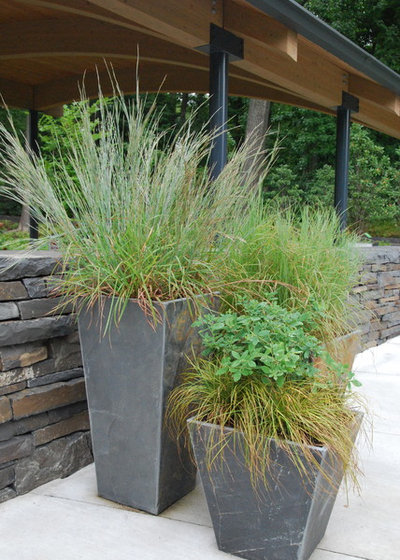
Paintbox Garden
Flared pots showcase native plants outside the entrance pavilion — you won't find geraniums or begonias here. Instead, ornamental grasses welcome you to this state-of-the-art landscape with plants indigenous to eastern North America.
More than 100,000 plants cover this 3½-acre USDA zone 7a location, inspiring anyone looking for ways to develop a sustainable landscape or combine plants in new ways. On a recent visit, I found a new baptisia that I'd like to try — the short purple cultivar
'Purple Smoke' (
Baptisia australis 'Purple Smoke'), because I love anything with purple spikes.
Winding paths take you through a woodland and connect to other distinct areas. There's a glade, wetland, wet meadow, dry meadow, native border and promenade walk that runs along an angular 230-foot-long water feature that cuts through the center of the landscape.
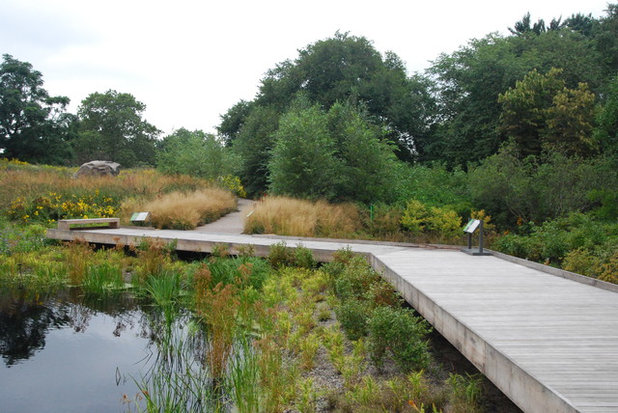
Paintbox Garden
"The whole site is a tribute to the rich, diverse flora of the Northeast," says principal designer Sheila Brady of Oehme, van Sweden. “We pivoted the design around the geology, all the beautiful rock outcroppings, the wet meadow and the mature forest nearby.”
One of the project goals was to integrate a sustainable water feature. "We capture all the surface runoff in a system that utilizes biofiltration and minimizes potable water usage," Brady says. Storm water is filtered through plants like
sweetflag (
Acorus sp) and stored in cisterns belowground.
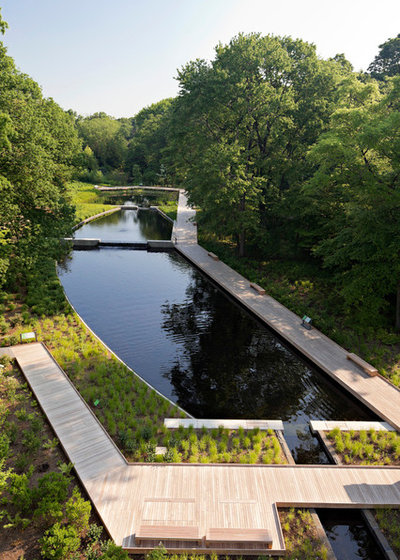
The New York Botanical Garden
In the specially designed wetland, a pump recirculates rainwater, moving it through layers of gravel, sand and plant roots that filter and clean the water through this natural biofiltration system.
Slender blue flag iris (
Iris prismatica 'Exeter'), one of only three iris species native to New York, can be found along the boardwalk. If you've got wet soil, a pond or stream, you'll be interested to know that this tough perennial naturally occurs in these types of areas and has a lovely spring bloom.
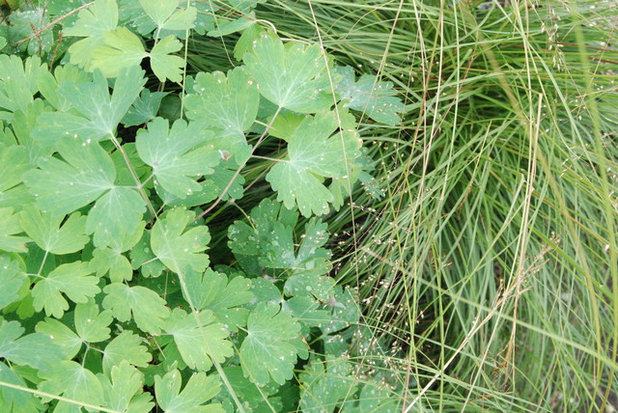
Paintbox Garden
In the dappled light of the woodland, clumps of
wild columbine (
Aquilegia canadensis) mingle with
prairie dropseed (
Sporobolus heterolepis), a delicate grass with wand-like seed heads.
Aquilegia canadensis ‘Little Lanterns’, called
Canadian columbine, is mixed into the displays and is more intensely colored than the species.
Red Northern lady fern (
Athyrium ‘Lady in Red’) forms a ground cover, along with
eastern teaberry (
Gaultheria procumbens) and
Appalachian sedge (
Carex appalachica).
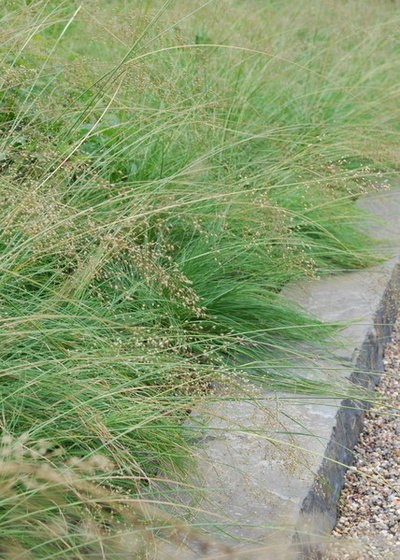
Paintbox Garden
Prairie dropseed cascades along the edges of walkways and adds a tactile element.
"What really intrigued me was how, even with a simplified plant palette, a very strong sense of place for each habitat area was communicated," says garden photographer Karen Bussolini.
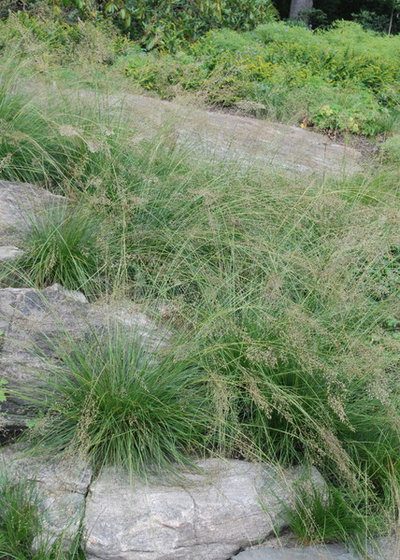
Paintbox Garden
Grasses abound on rocky slopes, where they soften the hard contours of boulders.
For Bussolini, who also works as an ecofriendly garden coach in northwestern Connecticut, the plantings are inspirational. "The garden is full of really great plants, any one of which would be an asset in any garden, but here grown in community," she says. "The patterns of intermingling plants were endlessly fascinating, and I left inspired to try quite a few of them."
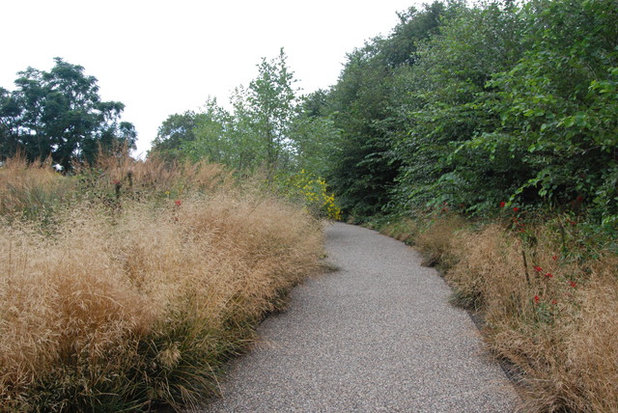
Paintbox Garden
Noteworthy species on view along the meadow path include
tufted hair grass (
Deschampsia cespitosa) and
wavy hair grass (
Deschampsia flexuosa), both planted en masse along a grove of river birch (
Betula nigra 'Heritage', zones 3 to 7).
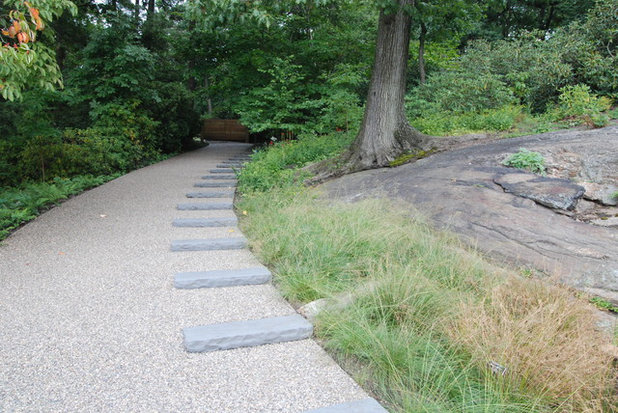
Paintbox Garden
I love how these granite steps have been creatively integrated into an accessible path that runs near a rock outcropping, overlooking the wetland. The paths are made with Gravel-Lok, a sustainable material that allows rainwater to filter through without puddling.
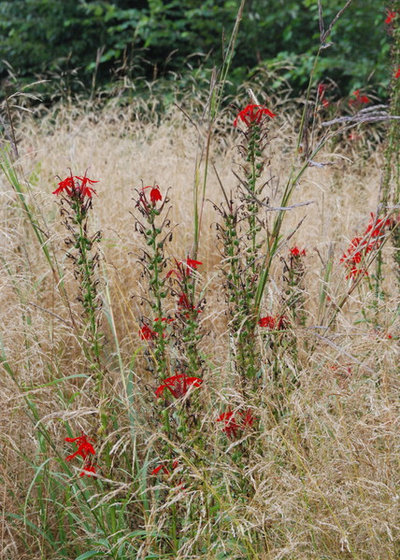
Paintbox Garden
Right plant, right place is the golden rule for gardening. For anyone with poorly draining soil, the garden's Wet Meadow includes many plants that can take tough growing conditions, like
tall cardinal flower (
Lobelia cardinalis). Adapted to bogs, stream banks and poor soils, it is a native from southeastern Canada all the way to Central America.
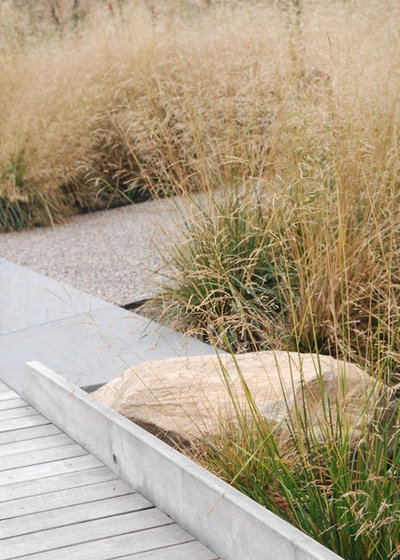
Paintbox Garden
Seen in late-afternoon light on a low angle, the rich tapestry of grasses is spectacular. They'll be hitting their peak color soon as frost approaches. In winter they'll provide a critical nesting habitat for many species.
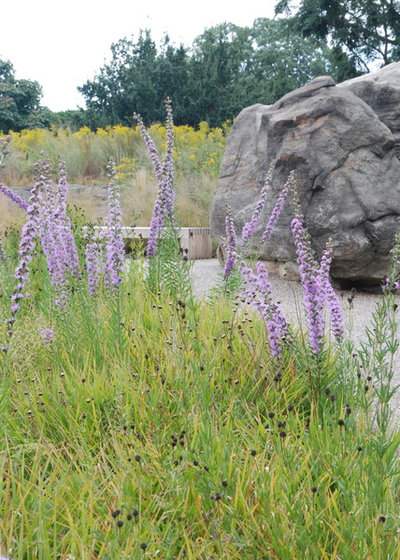
Paintbox Garden
As you come up the path through the Dry Meadow, an enormous granite specimen looms — called Split Rock. It's a prominent focal point, sited in the path so that visitors can easily touch its contours, peer into the space where the rock has split in two and learn about the local geology.
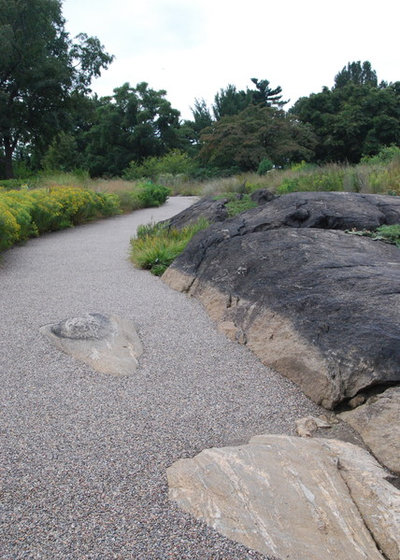
Paintbox Garden
The upper reaches of the meadow path are punctuated by dramatic rock outcroppings and boulders set into the walkway material. Designing around existing rock formations can be interesting, as they create a warmer microclimate and can demand a specific plant palette due to the nature of the soil.
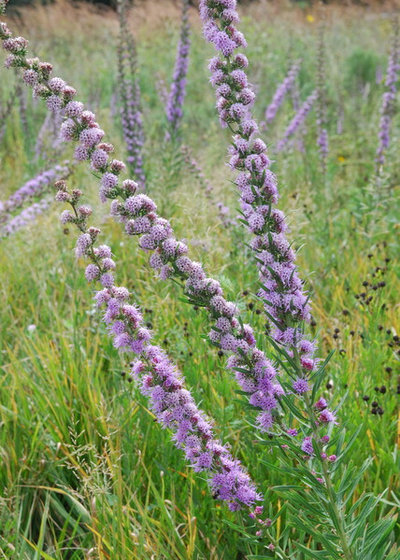
Paintbox Garden
“What makes this garden special is that it was not only designed to be a beautiful and inspiring garden, but it was also designed to teach our visitors the essential role that plants play in the living ecosystem all around us,” says Jody Payne, curator of the Native Plant Garden.
Bees of all kinds are drawn to tall blazing star (
Liatris aspera), which also attracts finches that eat the seeds. It's growing with
purple love grass (
Eragrostis spectabilis), which has a habitat range that extends from Maine to Florida.
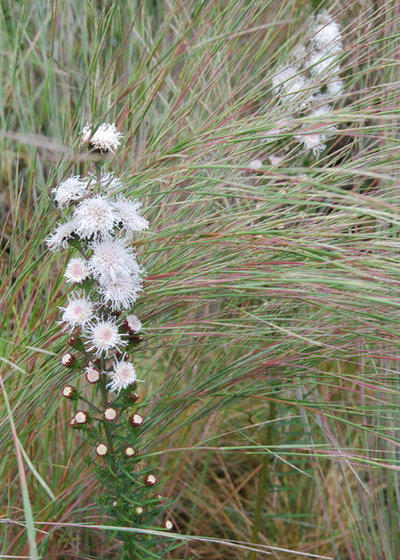
Paintbox Garden
One of the most beautiful meadow grasses is
little bluestem (
Schizachyrium scoparium 'The Blues'). Here its tawny foliage brushes against
New England blazing star (
Liatris scariosa var.
novae-angliae) in the hot, dry microclimate.
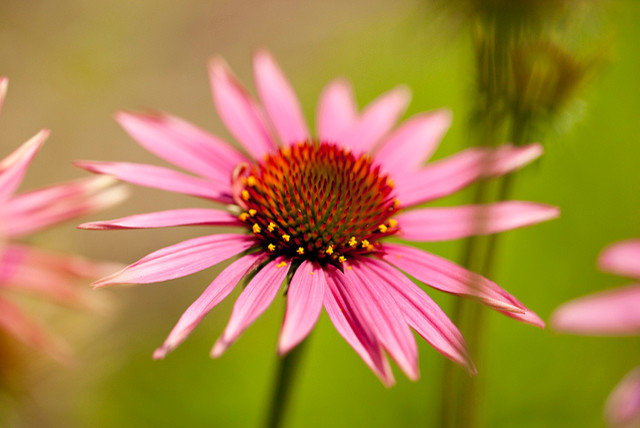
The New York Botanical Garden
Strong-stemmed
coneflowers (
Echinacea sp) are scattered throughout the meadow. Butterflies adore the nectar. In winter their seed heads will provide food for birds.
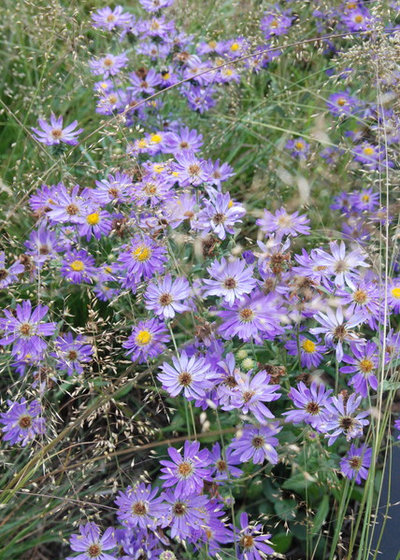
Paintbox Garden
From September to November there's a changing palette —
Eastern showy aster (
Eurybia spectabilis) is a standout, with masses of light purple flowers, and a tall dark purple
New England aster called 'Marina Wolkonsky' caught my eye in the Native Border. Asters are found growing throughout North America east of the Rocky Mountains, and New England asters grow widely through the Northeast.
Shrubs with notable late-season foliage include
high bush blueberry (
Vaccinium corymbosum) and sweet pepperbush (
Clethra alnifolia, zones 4 to 9). Some of my favorite trees are here too —
'Winter King' hawthorne (
Crataegus viridis) and the lovely
fringe tree (
Chionanthus virginicus).
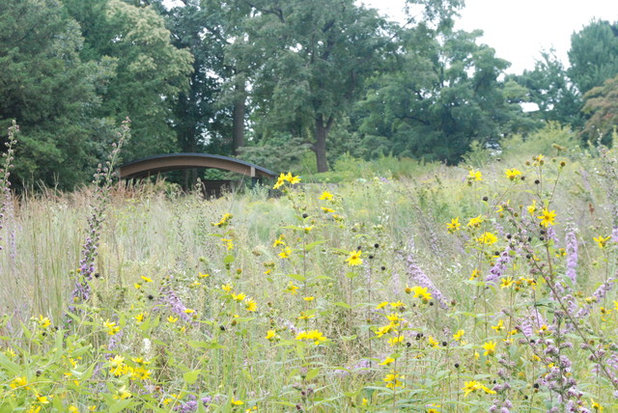
Paintbox Garden
"Naturescaping is gardening in sympathy with nature, learning from the ways natural plant communities sustain themselves," comments Bussolini. "It's gardening to attract wildlife, restore backyard ecosystems, conserve resources [and] reduce pollution and maintenance."
It's a sensibility that's gaining ground. Recent books on the subject include
Beautiful No-Mow Yards,
The American Meadow Garden and
Bringing Nature Home.
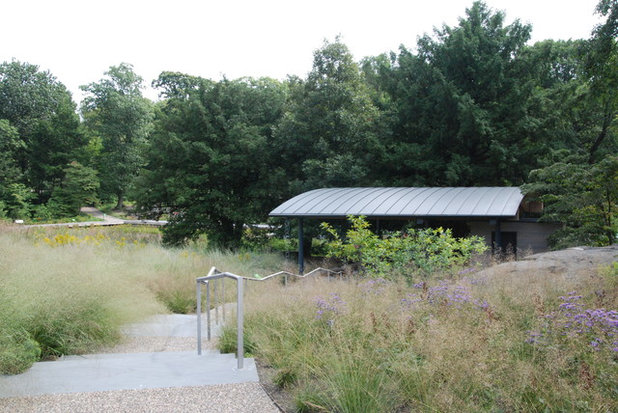
Paintbox Garden
The education pavilion is a shady place where you can sit, and it also functions as an outdoor classroom. Educational programs take place here year-round.
More info: Native Plant Garden at the New York Botanical Garden





